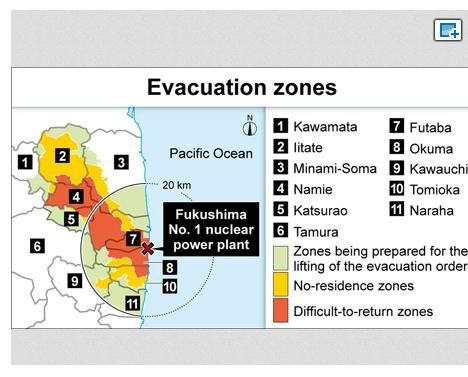
The ruling parties came up with a proposal to provide additional support directed at residents of difficult-to-return zones.
The circumstances of each community must be taken into account to maintain fairness.
Dear all,
Thank you all for visiting, reading and sharing the news with me on the Fukushima Appeal Blog. I’ve kept it running since February 2012. Unfortunately, I will need some break now to attend to some of my health issues.
I would like to thank this blog and its supporters for giving me an opportunity to become a part of the slowly awakening global community during this very important time of global change. I had zero knowledge of nuclear before the Fukushima disaster, and was and still am a just normal citizen. It’s been hard to see Japan becoming a criminal, immoral and authoritarian country since the Fukushima Disaster. So it’s been a huge awakening and healing process to have a platform to speak out instead of feeling powerless, angry and sad about it. With the new secret law that is going to be introduced in Japan soon, Japanese people will need more help than at any other time in its history from foreign bloggers, doctors and scientists. Please remember Fukushima. I hope that the more difficulties we may encounter, the stronger and connected we will become to fight against injustice and be able to act from our heart space. (Mia)
日本の皆さん、がんばってください。 再稼動反対、子供を守れ! 1mSv/yの約束を守れ!
For more Fukushima update go to: www.nuclear-news.net, http://fukushima-diary.com/, https://www.facebook.com/fukushima311watchdog, http://enenews.com/, http://www.fukuleaks.org/web/, http://www.nuclearhotseat.com/ http://ex-skf.blogspot.co.uk/
Petition: Support Mari Takenouchi and Radiation Protection
日 本の皆様へ、個人的な感情面から、竹ノ内真理さんのことを批判したい方は、すでにそうしたのだから、これからは、その時間とエネルギーをエートス批判に向 けるべきではないでしょうか? そしてボランテイアで、海外に向けて、英語発信する真理さんは、海外の情報源にとって、貴重な存在だと思います。 (Mia)
Urgent Petition: ttp://www.change.org/en-GB/petitions/ask-japanese-government-promise-for-necessary-aid-for-children-who-are-still-exposed-radiation-more-than-1msv-year-3

National Parents Network to Protect Children from Radiation
“I hope that every child in Japan is given comprehensive thyroid blood testing including at the minimum TSH, Free T4, Free T3 and thyroid antibodies. Their thyroid function should be regularly tested on an ongoing basis. “ By Dana Trentini http://fukushimaappeal.blogspot.co.uk/2013/11/thyroid-testing-for-japanese-children.html
*latest Fukushima Thyroid examination results released on Nov 12. (Complete English translation) (Source) http://fukushimavoice-eng2.blogspot.co.uk/2013/11/thirteenth-prefectural-oversight.html
National Parents Network to Protect Children from Radiation
*Fuel Removal From Fukushima's Reactor 4 Threatens 'Apocalyptic' Scenario In November, TEPCO set to begin to remove fuel rods whose radiation matches the fallout of 14,000 Hiroshima bombs
http://www.commondreams.org/headline/2013/10/24-3
*Statement: Japanese civil society requests that the reports of the United Nations Scientific Committee on Fukushima be revised 日本の64の市民団体が福島事故に関しての国連科学の報告内容を改訂するよう要請 www.http://hrn.or.jp/eng/a tivity/area/worldwide/japanese-civil-society-requests-that-the-reports-of-the-united-nations-scientific-committee-on-fukus/
Anand Grover, Esq., UN Special Rapporteur on the right to health, criticizes UNSCEAR report on Fukushima -10/24/2013 (1 of 4)国連「健康に対する権利」の特別報告者のアナンド・グローバー氏: 国連科学の報告を批判 Video - http://vimeo.com/78483070 October 24, 2013 (NYC, NY)
*Medical experts criticize UNSCEAR report for playing down consequences of Fukushima nuclear accident ドイツの専門家が国連科学の報告書を、「福島事故の影響を過小評価している」と批判! http://www.save-children-from-radiation.org/2013/11/05/medical-experts-criticize-unscear-report-for-playing-down-consequences-of-fukushima-nuclear-accident/
*Frightening Report from the UNSCEAR (The United nations Scientific Committee on the Effects of Atomic Radiation UNSCEAR-国連科学委員会による、恐るべき報告。http://fukushimaappeal.blogspot.co.uk/2013/05/frightening-report-from-unsear-united.html
*Heavily Criticized Recent WHO Report on Health Risk Assessment from the Fukushima Disaster 厳しく批判された最近の福島事故による健康被害についてのWHO報告 http://fukushimaappeal.blogspot.co.uk/2013/03/who-report-on-health-risk-assessment.html
*UN Report – Japanese Delegation to The UN Spreads Lies and Deception! 国連報告書2013年4月 国連への日本政府代表団のうそとごまかし! 抗議締め切り5月17日! http://fukushimaappeal.blogspot.co.uk/2013/05/un-report-japanese-delegation-to-un.html
*まとめ:国連報告書2013年4月 国連への日本政府代表団のうそとごまかし! 抗議締め切り5月17日!http://fukushimaappeal.blogspot.co.uk/2013/05/un-report-japanese-delegation-to-un.html
*A letter to all young athletes who dream of coming to Tokyo in 2020 東京オリンピックを目指している若い選手の方々へ Some Facts You Should Know About Fukushima 0.086Bq/kg was normal amount of ionizing radiation in fish before the Fukushima accident. Now it is 100Bq/kg 1160times more radioactive. http://fukushimaappeal.blogspot.co.uk/2013/10/a-letter-to-all-young-athletes-who.html
Fukushima Petitions ☢ Please Sign and Share! Japan needs Worldwide Help NOW! Stop Fukushima Radiation – UN Action Needed
https://secure.avaaz.org/en/petition/STOP_FUKUSHIMA_RADIATION_UN_ACTION_NEEDED/
Mobilize the U.N. Security Council to declare Fukushima a global emergency;
http://petitions.moveon.org/sign/mobilize-the-un-security
*Tokyo radiation is worse than Gomel - Mika Noro’s speech on the impact of radiation in Japan http://fukushimaappeal.blogspot.co.uk/2013/07/tokyo-radiation-is-worse-than-gomel.html
*Police arrest animal rescuers inside Fukushima evacuation zone — “They cannot be contacted and are being charged with crimes” http://fukushimaappeal.blogspot.co.uk/2013/02/police-arrest-animal-rescuers-inside.html
Resistance posted by Ian Thomas Ash, a director of Fukushima Documantary Film "A2-B-C"
… As one does not train with weight that is too light,….. And as I write this, I realize something for the first time: the more I embrace the resistance, the more I am becoming it. http://ianthomasash.blogspot.jp/2013/11/resistance.html
*福島原発で働く皆さんへ、世界からの暖かいメッセージ http://nuclear-news.net/2013/12/01/to-the-fukushima-workers-we-support-you-address-to-j-village-supplied/
(Japanese translation)http://goo.gl/re5822
*Fukushima Farmers negotiate with Japanese Government/Tepco 福島農家の若者、政府と東電に対して勇気ある発言 http://fukushimaappeal.blogspot.co.uk/2013/09/fukushima-farmers-negotiate-with.html The current government limit is 100Bq/kg... 0.1Bq/kg for cesium in rice before the Fukushima disaster. … We feel guilty about growing it and selling it...
*Atomic bombs survivors received fair compensation, not so in Fukushima!
広島・長崎の被爆者援護法:追加1ミリ被曝で被曝者認定、福島事故被害者にも認定を、するべき!
The Japanese Gov recognizes radiation related illnesses! http://fukushimaappeal.blogspot.co.uk/2013/05/atomic-bombs-survivors-received-fair.html

No comments:
Post a Comment